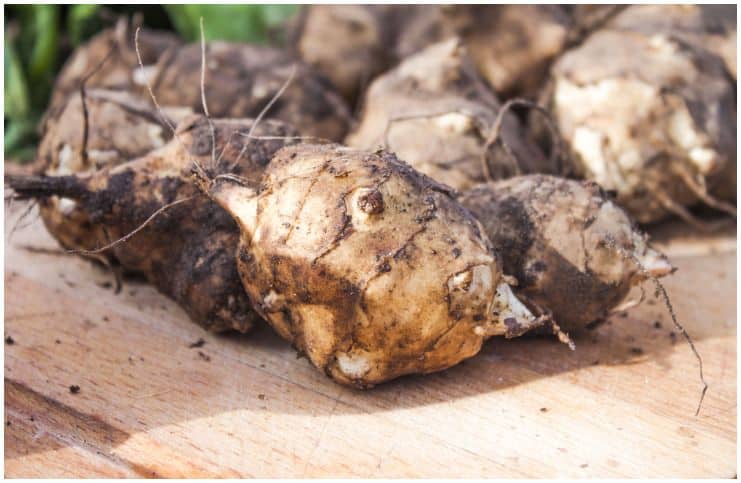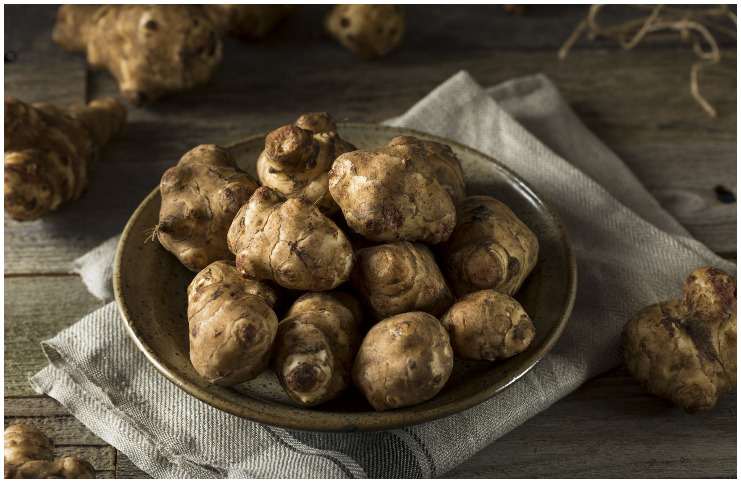Jerusalem artichokes (botanical name – Helianthus tuberosus), also known as sunroots or sunchokes, are used as a root vegetable and occasionally as a substitute for potatoes.
Native to North Central America, they belong to the sunflower family and have nothing to do with artichokes or with Jerusalem. The skin of this vegetable is usually light brown to creamy in color and the interior may be white or cream-colored.
Nutrition Profile of Sunroots
This plant is a good source of dietary fiber (in the form of inulin), vitamins, like – niacin, thiamine, pantothenic acid, riboflavin, pyridoxine, folate, C, E, minerals which include – phosphorus, calcium, copper, iron, potassium, selenium, manganese, zinc, and magnesium, protein and has no fat or sodium.
Health Benefits of Jerusalem Artichoke
Acts as a prebiotic
It is loaded with inulin, a type of fiber that although not digestible by humans in the gastrointestinal tract, acts as a prebiotic in the digestive tract, where your bacteria use it to prosper.
In your gut, this starch is converted into short-chain fatty acids that are converted to ketones. Furthermore, when inulin is combined with liquid, due to its chemical composition it forms a creamy gel that’s good for relieving constipation.
Prevents iron-anemia
Iron is a crucial dietary mineral needed to help our red blood cells deliver vital oxygen to the body. Iron also plays an essential role in energy creation, muscle function, and brain development. This vegetable contains non-heme iron whose absorption can be improved with vitamin C.
Low iron levels can cause humans to develop iron anemia. Symptoms of anemia include feeling tired, headaches, weakness, shortness of breath, cold hands, pale skin, or poor ability to exercise.
100g of this vegetable contains 43% iron of the recommended daily intake.
Improves brain function
Vitamin B1, also known as thiamine, helps the body convert sugar into energy and improves concentration and memory. In addition, adequate levels of thiamine are associated with balanced emotional well-being.
Thiamine deficiency can cause weakness and tiredness, irritability, and unexplained weight loss.
100g of this vegetable contains 17% thiamine of the recommended daily intake.
Osteoporosis
Calcium is an essential mineral that the body needs for good health. About 99% of the calcium in the body is stored in the teeth and bones. This mineral combines with other important minerals to form the hard crystals that give your bones their structure and strength.
The best method to prevent osteoporosis is to get the recommended level of calcium intake from a plant-based diet rich in calcium combined with daily moderate physical exercise.
100g of this vegetable contains 11% calcium of the recommended daily intake.
Boosts your energy levels
Phosphorus is a vital mineral found in every cell in the body which helps your kidneys effectively excreting wastes, build strong teeth and bones, assist in muscle contraction, important in cell repair and maintenance, and it’s involved in the body’s energy production.
Signs of phosphorus deficiency include – loss of appetite, teeth weakness, fatigue, irregular breathing, joint or bone pain, anxiety, weight changes, or poor bone development in children.
100g of this vegetable contains 11% phosphorus of the recommended daily intake.
Heart disease prevention

This vegetable contains no LDL (bad) cholesterol that contributes to plaque, a deposit that can make arteries less flexible and eventually may lead to atherosclerosis.
More importantly, high LDL (good) cholesterol levels are one of the main risk factors for heart disease.
Muscle building
Potassium is an important nutrient for the proper function of all tissues, cells, and organs in the human body and vital to your muscles contracting as you practice physical exercise.
People who regularly consume high potassium foods have a lower risk of stroke, particularly ischemic stroke. Potassium deficiency includes – severe headaches, anemia, dehydration, fatigue, heart palpitations, high blood pressure, swelling of tissues, and irritability.
100g of this vegetable contains 9% potassium of the recommended daily intake.
Improves digestion
These tubers are renowned for their heliangine content, a bitter substance that stimulates the secretion of the stomach and helps to relieve dyspepsia and indigestion.
Selection and storage
Fresh sunchokes look vibrant and plump. Unlike potatoes, this vegetable cannot be stored for many months. However, if they are stored in a paper bag in a dark place, you can store them for 7-10 days.
How to eat
Jerusalem artichokes are edible cooked or raw, including the skins. These amazing tubers are compatible with many flavorings and are usually eaten as side dishes or in soups.
Note – once they are peeled, it is recommended to sprinkle them with lemon juice to prevent them from turning black.
Substitute
New red potatoes and sweet potatoes are good substitutes for this vegetable.
Side effects of Jerusalem artichokes
Stomach problems may occur – including flatulence, uncomfortable bowel movements, loose stools, and diarrhea due to their high content of inulin. People who are sensitive to daisies or marigolds can experience an allergic reaction.
References https://www.ncbi.nlm.nih.gov/pmc/articles/PMC4619305/ https://www.ncbi.nlm.nih.gov/pubmed/17951504 http://umm.edu/health/medical/altmed/supplement/phosphorus








Thank you, ANCA B. for your enlighte ment of Artichoke’s health benefits.
My pleasure, Phillip A. Have a good day.
We had Jerusalem artichokes 2 night in a row. Roommate is an alcoholic and now is having severe tummy pains. And yes alcohol makes them worse. Is this a side effects of Jerusalem artichoke??